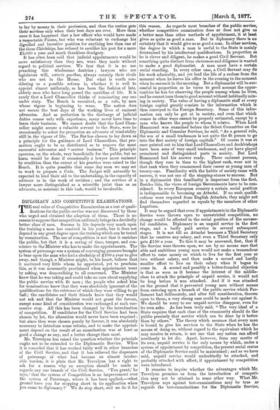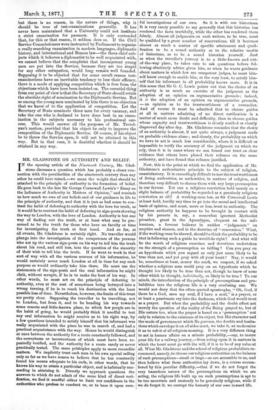DIPLOMACY AND COMPETITIVE EXAMINATIONS.
real value of Competitive Examination as a test of quali- fications for the public service was not discovered by those who urged and obtained the adoption of them. There is no reason to suppose that competition uniformly brings in a decidedly better class of men. Success in life depends very much upon the training a man has received in his youth, but it does not depend in any great degree upon the training which can be tested by examination. The use of competition is not that it enriches the public, but that it is a saving of time, temper, and con- science to the Minister who has to make the appointments. The system of patronage was a system of converging pressure brought to bear upon the man who had a clerkship of £100 a year to give away, and though a Minister might, in his heart, believe that it mattered very little whom he appointed, yet to proclaim this, as it was necessarily proclaimed when appointment went by asking, was demoralising to all concerned. The Minister knew that he was taking and could take no care about supplying the public service with fit men ; the people who asked him for nominations knew that they were absolutely ignorant of the qualifications for the existence of which they were willing to go bail ; the candidates and their friends knew that they would not ask and that the Minister would not grant the favour, except some kind of consideration was exchanged at each suc- cessive step. All this has been changed by the introduction of competition. If candidates for the Civil Service had been chosen by lot, the alteration would never have been required ; but since they were chosen purely by favour, it was absolutely necessary to introduce some reform, and to make the appoint- ment depend on the result of an examination was at least as good a change as any, and a better change than most. Mr. Trevelyan has raised the question whether the principle ought not to be extended to the Diplomatic Service. When it is conceded that it has worked fairly well in other branches of the Civil Service, and that it has relieved the dispensers of patronage of what had become an almost intoler- able burden, it is plain that Mr. Trevelyan has a right to ask for a reason why an exception should be made as regards any one branch of the Civil Service. 'You grant,' he says,' that the system of Competition is an improvement over the system of Patronage, where it has been applied,—what ground have you for stopping short in its application when you come to diplomacy ?' We do stop short, and we do it for
this reason. As regards most branches of the public sertioe; whether competitive examination does or ,does not give us a better man than other methods of appointment, it at least gives as quite as good a man. But in diplomacy there is no certainty that it would give us as good a man. In other services, the degree in which a man is useful to the State is mainly determined by his intellectual qualifications. In proportion as he is clever and diligent, he makes a good Civil Servant. But something quite distinct from cleverness and diligence is wanted to make a good diplomatist. A man must have a certain social standing. In every other case a Civil-Servant may do his work admirably, and yet lead the life of a recluse from the moment when he leaves his office in the evening to the moment when he enters it in the morning. But a diplomatist will be suc- cessful in proportion as he turns to good account the oppor- tunities he has for observing the people among whom he lives, and he cannot turn them to good account without habitually mix- ing in society. The value of having a diplomatic staff at every foreign capital greatly consists in the information which is thus conveyed to the Foreign Secretary. Some of this infor- mation can only be got at in society, and even that which comes in other ways cannot be properly estimated, except by a man who knows the people to whom it relates. When Lord Hammond was examined before the Select Committee on the Diplomatic and Consular Services, he said, "As a general rule, the son of a small tradesman is not quite the fit person to go into the first society of foreign capitals." Of course it was at once pointed out to him that Lord Chancellors and Archbishops have been sons of very small tradesmen, and yet have played prominent and distinguished parts in society. But Lord Hammond had his answer ready. These eminent persons, though they rose in time to the highest rank, were not iv that rank when they commenced their career as young men of twenty-one. Familiarity with the habits of society came with success, it was not one of the stepping-stones to success. But in a diplomatist this familiarity is important from the first. Besides this the views of foreign Governments have to be con- sidered. In every European country a certain social position is indispensable to becoming an Attache. If no such qualifi- cations were required from English Attaches, they might not find themselves regarded as equals by the members of other Legations. It may be argued that even if appointmentain the Diplomatic- Service were thrown open to unrestricted competition, no change would be effected in the social position of the success- ful candidates. Diplomacy is an unpaid service in the first stage, and a badly paid service in several subsequent stages. It is not till an Attache becomes a Third Secretary that he receives any salary, and even a Third Secretary only gets £150 a year. To this it may be answered, first, that if the Service were thrown open, we are by no means sure that able and ambitious young men would not make a tremendous effort- to raise money on which to live for the first year or two without salary, and then make a second and hardly smaller effort to live on their salary when it began to come in. A second and possibly a better-founded objection is that as soon as it became the interest of the middle- class to attack the principle of unpaid service, it would not be long before it was attacked. And if it was attacked on the ground that it prevented young men without means from entering upon a branch of the public service which Par- liament had deliberately, and after full consideration, thrown open to them a very strong case could be made out against it. We should be sorry to see unpaid service disappear, even for its own sake. As has been truly said, "The very ideal of a State requires that each class of the community should do the public precisely that service which can be done by it better than by others." The theory which assumes that every man is bound to give his services to the State when he has the means of doing so, without regard to the equivalent which he may receive in return, is not one that any -nation can afford needlessly to let die. Apart, however, from any merits of its own, unpaid service is the only means by which, under a system of appointment by competition, the present social status of the Diplomatic Service could be maintained ; and as we have said, unpaid service would undoubtedly be attacked, and probably attacked with effect, if appointment by competition were introduced.
It remains to inquire whether the advantages which Mr. Trevelyan promises us from the introduction of competi- tion may not be attained in some other way. What Mr. -Trevelyan says against test-examinations may be true as regards the test-examinations for the Diplomatic Service,
but there is no reason, in the nature of things, why it should be true of test-examinations generally. It has never been maintained that a University could not institute a strict examination for passmen. It is only contended that, for this or that reason, it seldom does so. If the Civil Service Commissioners were instructed by Parliament to organise a really searching examination in modern languages, diplomatic history, and international and Roman law—the three chief sub- jects which it behoves a diplomatist to be well acquainted with, we cannot believe that the complaint that incompetent young men are put into the Service, because they are too stupid for any other oce'npation, would long remain well founded. Supposing it to be objected that for some occult reason test- examinations have an inevitable tendency to lose their efficacy, there is a mode of applying competition which is free from the objections which have here been insisted on. The essential thing from our point of view is that the Secretary of State should retain the absolute right of nomination to the Diplomatic Service. But as among the young men nominated by him there is no objection that we know of to the application of competition. Let the Secretary of State nominate three men for every vacancy, and take the one who is declared to have done best in an exam- ination in the subjects necessary to his professional suc- cess. This would answer all the purposes of Mr. Trevel- yan's motion, provided that his object be only to improve the composition of the Diplomatic Service. Of course, if his object be to throw the Service open, it will not be attained in this way. But in that case, it is doubtful whether it should be attained in any way.



































 Previous page
Previous page